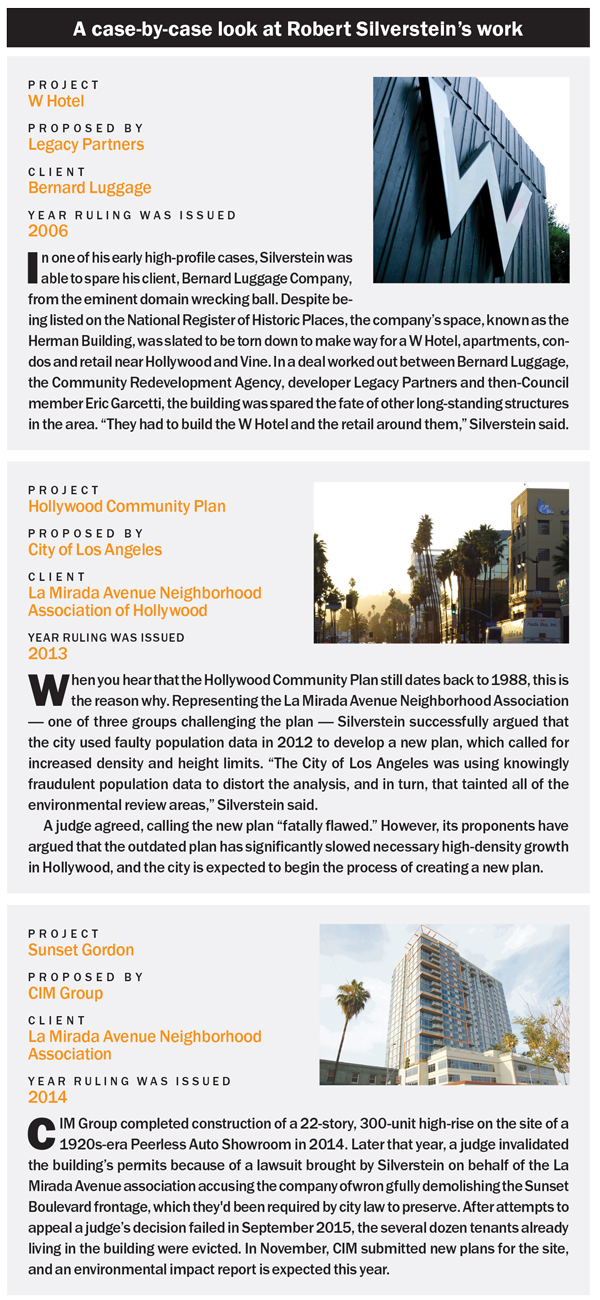Robert Silverstein’s office, buried in a large commercial building off of Colorado Boulevard in Pasadena, has few of the trappings that one might expect of a space occupied by the most influential land-use attorney working in the thriving metropolis that is Los Angeles.
The walls are mostly barren aside from a few thank-you notes from past clients. He has no prominently displayed awards, and upon initial meeting, he’s more interested in showing off an exotic Kaua’i Sugarloaf pineapple gifted to him than in boasting of his successes fighting City Hall.
But look closer, and the signs of a workhorse lawyer emerge. There’s the binders containing hundreds of thousands of pages of case files stacked on the floor. There’s the five now-empty coffee cups that sit within arm’s reach of his chair. And there’s the pillow and blanket on the couch for those nights when the job calls for little to no shut-eye. “I don’t sleep,” Silverstein said. “I just work and work and work.”
Over the past decade-plus, that work has seen Silverstein amass an impressive string of victories against government and powerful developers in battles over high-rise buildings and eminent domain takings. His arguments have halted or slowed prominent projects, gotten the Hollywood Community Plan overturned in court and earned him a reputation as a formidable opponent.
But as Silverstein’s stature has grown, a central question in the real estate community has emerged: Do developers and government officials take Silverstein seriously because his cases threaten a corrupt system that benefits them, or are they frightened because he’s simply an adept attorney who can pick apart laws to the benefit of himself and anti-growth, NIMBY clients?
Hitting the target
Silverstein’s most recent high-profile victory, which came this past spring in a case that’s practically synonymous with his name, is evidence of the former, he said. The Hollywood Target, a potential economic engine that sits as a partially built shell at the corner of Sunset Boulevard and Western Avenue, lost again in court in April. A judge sided with a petition brought by Silverstein’s client, the La Mirada Avenue Neighborhood Association, over the city’s process for approving the project.
It marked the second time the project lost to Silverstein and the association. In 2014, Los Angeles Superior Court Judge Richard Fruin Jr. ruled in favor of the group, which argued that the City Council illegally approved a 74-foot-tall Target despite zoning regulations for the area calling for a 35-foot height limit. After the city in 2016 rewrote the area’s Station Neighborhood Area Plan (SNAP) to allow for the taller building, Silverstein and the association again brought suit, winning when Fruin ruled that the city did not properly consider community impacts in its approval.
 For Silverstein, the case represents a cross section of what he said he’s spent his career fighting against: a “deeply corrupted process” in which politicians put their own self-interest and the needs of the powerful above both the law and the rights of those they were elected to govern. He likened the city’s entitlement process to “kabuki theater” where the public-hearing process takes place just for show after deals have been worked out behind closed doors.
For Silverstein, the case represents a cross section of what he said he’s spent his career fighting against: a “deeply corrupted process” in which politicians put their own self-interest and the needs of the powerful above both the law and the rights of those they were elected to govern. He likened the city’s entitlement process to “kabuki theater” where the public-hearing process takes place just for show after deals have been worked out behind closed doors.
And most of these controversial projects are approved through so-called spot zoning, where the city applies amended zoning requirements to a specific parcel of land, sometimes allowing for projects drastically out of step with their host communities. It’s essentially allowed developers to roll out the “welcome mat for any and every excessive kind of development.”
“People think I’m anti-development,” Silverstein said. “I’m not. I’m anti-bad development and I’m anti-illegal development … What I’m against is this culture of secrecy and rule-breaking that permeates L.A. City Hall.”
The fear factor
Mott Smith, principal of development and planning firm Civic Enterprise and a founding board member of the California Infill Builders Association, admits that developers “quake in their boots” when they hear Silverstein’s name.
However, Smith said, it’s not because they’re corrupt or didn’t do their due diligence on their projects. Rather, it’s because state laws and outdated city planning documents leave developers susceptible to lawsuits like the ones brought by Silverstein.
“If you’re working on a project and you hear that Robert Silverstein is getting involved on the other side of it, you don’t think to yourself, ‘Am I right? Do I have a good defense? Did I do my project right?’” Smith said. “You think, ‘I’m screwed’ and ‘How much of a check am I going to have to write?’”
Indeed, many of Silverstein’s petitions arise from the complex California Environmental Quality Act (CEQA), while others center on elements of Los Angeles’s community plans — some of which are almost 30 years old. Smith said those conditions have created a workaround of “planning by adjudication,” and Silverstein has created “a workaround for a workaround.”
“The way our laws are written and the way our plans are done, it’s very difficult for any project of a certain scale to escape the kind of discretionary approvals that Silverstein can very easily attack,” Smith said.
These are arguments that Silverstein said he has heard before — and ones that he quickly derides.
No matter how old the community plans are, he said, they were designed as expressions “of how the public wanted to see growth and development proceed” in each neighborhood. But, he adds, the city and developers have used the age of those plans to “constantly break the law.”
As for the assertion that he’s only winning cases because of his ability to nitpick expansive regulations, he said, “If all we had was a minor technicality, we wouldn’t be filing enormous trial briefs and spending years working on it.”
Zev Yaroslavsky, a former longtime Los Angeles City Council member, Los Angeles County Supervisor and current director of the Los Angeles Initiative at the UCLA Luskin School of Public Affairs, said that Silverstein’s lawsuits attack not only the problems with specific projects but issues with the city’s entitlement process as a whole.
Yaroslavsky, who called Silverstein “one of the more important figures in land use in the city,” said that L.A. developers find a piece of property and petition the city for upzoning to maximize their profits. In most cases, the developers get what they want, he said.
Silverstein has been a “finger in the dike” of that culture, holding builders and officials accountable and often costing them more than the project would’ve made had it gone through without any issues, Yaroslavsky said.
“He’s a very intense guy,” said the former City Council member. “And he’s a true believer: To him, the law is the law, and he’s going to hold the city to every letter of it.”
SNAP judgments
Silverstein’s detractors, some of whom have pegged him with titles such as “NIMBY lawyer,” dismiss his courtroom wins, arguing that his cases represent a small fraction of the community at large and only serve to bolster his bottom line.
Leron Gubler, president and CEO of the Hollywood Chamber of Commerce, said that the neighborhood as a whole wants the Target built because it represents jobs and shopping opportunities, but as it stands, halfway constructed, it’s an “eyesore.” In fact, the La Mirada Avenue Neighborhood Association, the plaintiff in several Silverstein lawsuits, has few known members. However, it has successfully opposed several projects in the neighborhood that have the support of the community at large. “[The association] doesn’t represent our membership in the Chamber, and I don’t think it represents the broader view of the community,” Gubler said. “There is no groundswell of opposition to the Target, I can tell you that.”
There’s also the question of the money that changes hands when these groups are successful. Smith, the developer, said that the settlements in these cases are often undisclosed, so it’s impossible to know exactly how much money an attorney makes on a CEQA challenge, for example.
Silverstein takes some cases on a pro bono basis and defers payment in others until a settlement is reached. But suffice to say, they can be sizable sums, Smith said.
“Several attorneys around the state have carved out a niche in championing the petitioner’s side of those lawsuits, and Silverstein is one of them,” Smith said.
In one example of a settlement, Silverstein’s law firm was awarded $780,000 from the city in 2014 for its role in the challenge to the Hollywood Community Plan.
Silverstein said he’s well aware of the criticism, but he brushes it off as the “whining of a side that is constantly losing.” He added that the large settlements come after years of work — ones in which he was deferring payment until the case was finished.
“If this was a good business model, you would see a lot more people doing it,” he said.
As for the argument that his clients don’t represent that community as a whole, Silverstein said that not everyone in Hollywood is opposed to the Target, but they likely are opposed to a corrupted process.
“Nobody that I know in the community supports the City Council violating the law … A lot of people don’t care about that particular issue, but everyone I know cares about trying to have more honesty and integrity in the process,” he said.
‘Dear Robert’
For Silverstein, a 30-year vegetarian and former freelance journalist, restoring integrity to that process begins with what he describes as David-versus-Goliath fights. He said it’s work that began in his career as a journalist, when he favored stories that questioned power, and continued as he entered the legal field, nearly immediately latching onto eminent domain cases.
While he had trouble pointing to the specific cases he’s most proud of, he recounted letters he’s gotten from past clients, reading aloud one from a family he represented in an eminent domain case: “Dear Robert, Thank you from the bottom of our hearts. You saved our home.”
And to him, notes like that makes the nights on the office couch worth it.
“I can feel good about what I do, and I can lay my head down on those few nights when I actually do go to sleep,” he said. “I know that we have fought the good fight.”
